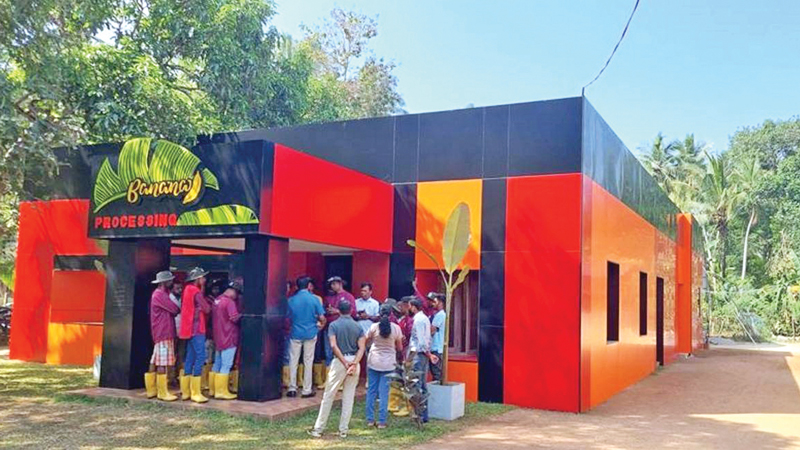Agricultural renaissance is gaining ground in Rajarata, with farmers opting to modern methods of cultivation and also making a change in the crops they cultivate and keen to switch to advanced agriculture technologies.
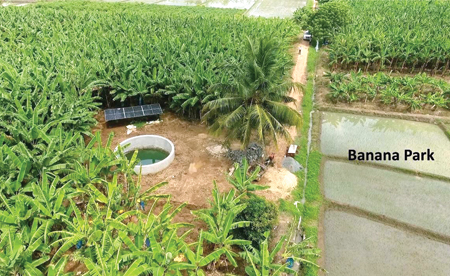
The Rajanganaya banana field with a solar-powered water pump
Farmers contend that the change enables thrifty land use, scientific water management and profitable marketing aiming at foreign and local markets.
A large number of foreign-funded agricultural and irrigational development projects such as the Climate Smart Irrigated Agriculture Project (CSIAP) and the Agriculture Sector Mordenisation Projects (ASMP) have contributed to this trend in the Anuradhapura and Polonnaruwa Districts.
The World Bank funded ASMP encourages agricultural development schemes in the North Central, Uva and Eastern Provinces. The ambul plantain cultivation project commenced in Rajangane in 2017.
The project comes under the purview of the Agriculture Ministry. The value of the project is US$58.63 million, of which 11.4 million dollars has been set aside for the North Central Province.
The ASMP objectives are to enhance agricultural output and encourage farmers to produce crops that have market competition by ensuring value addition practices. Supporting farmer communities to strengthen agricultural activities through technology is another objective.
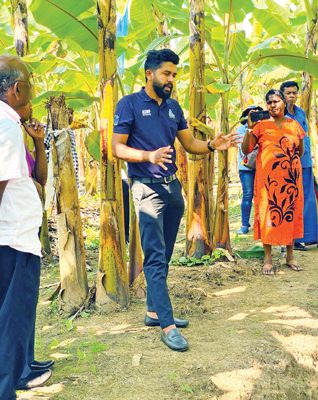
A demonstration on banana cultivation to farmers
The ASMP has been operating in the Anuradhapura Rajangane ambul banana plantations since 2021 and has spent nearly Rs 300 million to upgrade banana cultivation.
A new banana processing centre has also been set up in the Agrarian services centre. Now work related to quality improvement and exporting of the Rajangane bananas have been taken over by a farmer company known as ‘Rajangane’.
The objective of the enterprise is to improve ambul banana cultivation, enhance production, earn foreign exchange and create more jobs in the sector. A selected group of farmers are to be registered as a farmer production organisation and will be educated in the Farmer Business School in good agricultural practices.
Rajangane Ambul Banana Project
In the implementation of the Rajangane Ambul Banana Project, the Mahaweli Authority, the Agrarian Development Department, Provincial Agriculture Department, Provincial Irrigation Department, Provincial Engineering Department and the Provincial Road Development Authority will extend their support.
Banana farmers affiliated to the project are also given special training through the National Industrial Training Authority (NITA) to get the NVQ level 4 Certificate to enable them to carry out technology dissemination and extension activities on their own.
Banana cluster villages (Pokuru Gammana) are extended to the Rajangane colonisation scheme’s track 1, 2, 3, 4 and track 5. About 450 men and 100 women farmers benefit from the project.
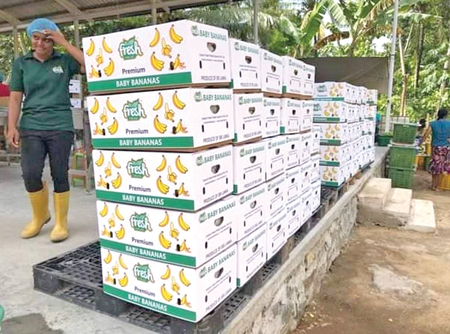
Banana ready for export
The project covers around 647.5 acres and the budgetary allocation stands at Rs. 200 million initially. Farmers are provided technical training in land preparation, cultivation wells, solar powered water pumps, sprinkling watering systems and covering bags.
According to the project management, 54 solar powered water pumps were distributed for common use and a mini weather station has been set up in the vicinity for weather reports and the water requirement for banana plantation on a daily basis.
Under the Rajangane Ambul Banana Project, nearly 108.000 kilograms were harvested of which between 27 percent and 30 percent was exported.
Operation and Evaluation specialist R. M. L. Ratnayaka said, “During the past two years, 66 containers of Ambul bananas were exported to the Middle East specially to Dubai and the Maldives. Around 150,000 kgs have been exported and the export value is US$ one million. The profit made by ‘Rajanganaya’ up to the end of last year stands at Rs. 13 million. Five hundred banana farmers have been enrolled with the PUC”.
It is also learnt that due to the slow progress in the exporting sector, a large surplus stock remains and is being locally marketed. Rajangane Integrated Farmer Organisation Chairman M. S. P. Jayathilaka said it was vital to make arrangements to ship 90 percent of the ambul banana harvest.
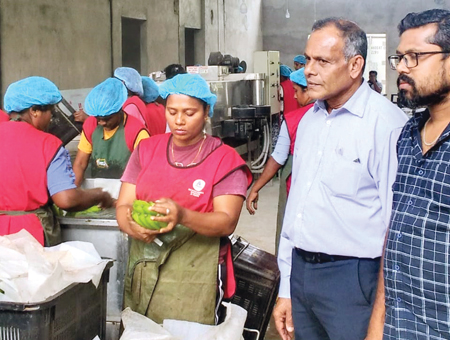
Deputy Project Director(NCP) R. M. D. S. S. Rathnayake (Centre)
Rajangane Residential Project Manager N. Wasantha said, “At the commencement of the project, bananas were cultivated in 75 acres and a single container was exported. Although, at present more than 400 acres are being cultivated, still only one container is being shipped.”
Future of banana farmers
Ratnayaka said the project was completed on December 31, 2024 and all activities of the banana cluster village was handed over to the ‘Rajanganaya’ , which is a Public Unlisted Company (PUC) registered under the Registrar of Companies. The formation of legally- owned farmer companies has shown a growing trend to implement collective agri-business activities under alternate income generating options.
The PUC is an independent body and the Board of Directors can make decisions to uplift the company. However, the Inter Provincial Agriculture Department of Anuradhapura has to provide technical advisory service and the National Enterprise Development Authority (NEDA) officer attached to the Divisional Secretariat has to guide the PUC members towards business development. The functioning of the PUC will be supervised by development officers working under the Ministry of Agriculture at the Divisional Secretariat level.
The company is empowered by the ASMP giving the technical and business management training as a sales agreement with an exporting company has been entered into for regular export of their produce.
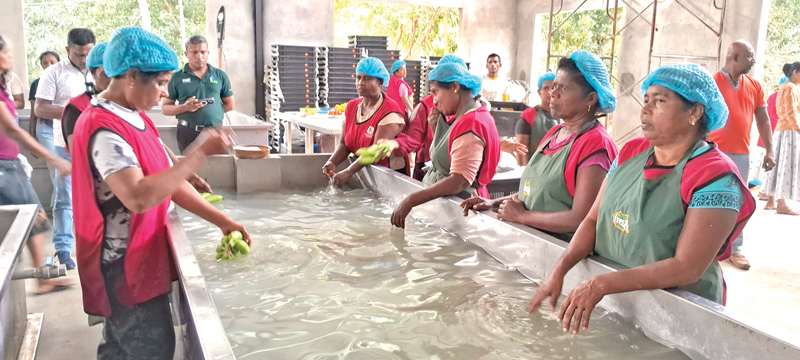
Banana processing for exporting purposes







